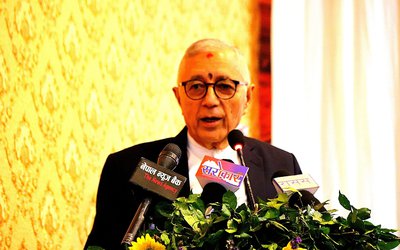One cannot imagine the horrors of living without civilization. It is difficult to picture a human living in isolation from fellow humans. However, H.P Lovecraft brings these horrors to life in his famous short story, The Outsider. He talks about a man who is alienated from society and is living alone in an unknown, dark castle. He desires to be around people, but when he finds them, they eschew him because of his appearance. In the story, Lovecraft describes the character and his habitat to show how isolation has destroyed him. He does this in order to tell the reader that society is important to keep humanity alive.
Lovecraft describes the unusual elements of the castle as a result of his separation from other humans. He talks about the “piled-up corpses of dead generations,” which illustrate the history of the castle. Lovecraft says that the character is not afraid of these corpses. He has been lonely for such a lengthy time that these dead bodies seem like furniture to him. He describes the passages to be “dark” and covered with “cobwebs and shadows,” which emphasize the absence of life in the forlorn castle. The books of the castle, which represent knowledge, are “mouldy,” which means that they are uncared for. Books are an excellent way of communication among human beings, but here, they are rotting away. These examples demonstrate the character’s surrounding without civilization.
The absence of live changes the character’s human traits. He cannot recall any memories of living things except “the noiseless rats and bats and spiders.” These word “noiseless” illustrates the lack of life even from the animals. He says that he “had never thought to try to speak aloud.” Language is what builds a society. The lack of language shows the extreme state of his loneliness. The narrator says there “was never light” or “any sun outdoors.” Light symbolizes truth because it reveals what is false. Therefore, the absence of light shows the character’s lack of knowledge about the truth of his deprivation from humanity. The privation of life causes the narrator to lose his natural human instincts.
The narrator’s appearance changes with the lack of interaction with society. When he finds himself in front of a mirror, he describes his reflection as “the inconceivable, indescribable, and unmentionable monstrosity.” Through these descriptions, one can imagine him decaying and rotting. He becomes a different creature in the eyes of fellow humans because of his separation from the world. He has not be educated or taken care of. He further describes his reflection to be “unclean” and “abnormal” which shows how he, himself, is repelled by his appearance. He can barely see the “human shape” on the “eaten-away and bone-revealing outlines,” which shows how his body is dissolving into that of a savage animal. Without a society, the narrator has become a “ghoulish” creature.
The Outsiderby Lovecraft is a story about a man who has not known civilization. He has grown up in a despicable, rotten surrounding without interacting with another form of life. Consequently, his human characteristics begin to fade, and completely disappear when he ends up with the “friendly ghouls.” Through the story, Lovecraft tries to show the consequences of not being in touch with civilization.
- Highlights of KUSL’s Launching Ceremony
- Aug 17, 2014
- Labour Force Leaving The Country
- Mar 24, 2014
- Thinking about Nepal’s Think Tanks
- Nov 10, 2013
- The five years’ BBM-LLB Course of the Kathmandu University Law School
- Sep 13, 2013
- JUDICIARY: Judging Judges
- Aug 30, 2013
















